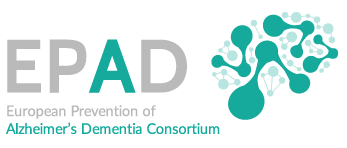European research initiative to test novel treatments for Alzheimer's disease
21 January 2015
The EPAD project has announced the start of a novel collaboration between 35 academic and private sector partners from Europe and the US to test innovative treatments for the prevention of Alzheimer’s dementia.
EPAD is mainly sponsored by the European Commission and the European pharmaceutical industry (via EFPIA) under the auspices of the Innovative Medicines Initiative Joint Undertaking (IMI JU). The EPAD programme has an initial budget of €64m distributed across a total of 35 partners from the private and academic sectors
The goal of the initiative is the prevention of dementia in people with evidence of the disease (such as biomarker abnormalities as identified by specific tests), who still may have little or no complaints or clinical symptoms.

“EPAD is part of a global initiative that will make a fundamental difference to the understanding and management of Alzheimer’s disease in people with very early or no symptoms at all. This could be a game-changer. It is only possible because of the absolute commitment of academics, industry, policy makers and the public to work hand in hand to defeat this global threat”, said Prof Craig Ritchie, EPAD Co-coordinator and Professor of the Psychiatry of Ageing at the University of Edinburgh.
New tools and methods now allow the identification of patients in the early stages of Alzheimer’s disease. This creates an opportunity to have new treatment options investigated in clinical studies early on. A difficulty, however, remains with the large number of patients and study sites needed to confirm a therapeutic effect within a limited span of time.
In contrast to several pharmaceutical companies and academic institutions pursuing this in isolation, a joint effort clearly has advantages: the identification and referral of the concerned patients is accelerated and several treatment options can be tested rapidly within one same trial.
Therefore, EPAD aims to develop a platform using existing information from national or regional patient cohorts or register studies, which have already identified potential patients. Through EPAD, the undertaking of better, adaptive, multi-arm proof of concept studies for early and accurate decisions on the ongoing development of drug candidates or drug combinations is facilitated.
“Preventing the development of dementia in biomarker-positive people would be a fantastic step forward in our fight against Alzheimer’s disease. The EPAD and its novel trial concept will hopefully help speed up the drug discovery progress and bring us closer to this ambitious aim”, said Jean Georges, Executive Director of Alzheimer Europe.
All data collected from the cohort and trial will become publically available for analysis to improve disease models in the pre-dementia phase of Alzheimer’s disease.
“This project has numerous advantages over current approaches. These include the excellent pre-trial characterisation of subjects to inform selection and reduce screen failure, the establishment of the highest possible quality study sites across Europe, the rapid decision making on the likely success of a drug (or combination of drugs) in subsequent confirmatory trials as well as access to a shared placebo group.”, said Serge Van der Geyten, EPAD Coordinator and Director for Neuroscience External Affairs at Janssen Pharmaceutica NV.
About EPAD
The EPAD project is part of a global effort in the fight against Alzheimer’s disease, which also includes initiatives such as the Global Alzheimer Platform. The EPAD Project is a major European initiative to create a novel environment for testing numerous interventions targeted at the prevention of Alzheimer’s dementia defined as a delay in the onset of clinical symptoms among people with preclinical evidence for AD pathology (ie preclinical AD as per NIA-AA and similar definitions) and a delay in the onset of clinical dementia among people with such evidence who already show some clinical symptoms (ie MCI due to AD or prodromal AD and similar definitions).
The 35 partners from the private and academic sectors:
- Janssen Pharmaceutica NV, Belgium
- University of Edinburgh, United Kingdom
- University of Oxford, United Kingdom
- Barcelonabeta Brain research Centre at Pasqual Maragall Foundation, Spain
- Synapse Research Management Partners SL, Spain
- Karolinska Institutet, Center For Alzheimer Disease Research, Sweden
- Stichting VU-VUmc, Netherlands
- University of Cambridge, United Kingdom
- Medical Research Council Biostatistics Unit, United Kingdom
- Berry Consultants LLP, United Kingdom
- Université de Genève, Switzerland
- Radboud University Medical Centre, Netherlands
- Cardiff University, United Kingdom
- Centre Hospitalier Universitaire de Toulouse, France
- Quintiles, LTD, United Kingdom
- Alzheimer Europe, Luxembourg
- Erasmus Universitair Medisch Centrum Rotterdam, Netherlands
- Hôpital de la Salpêtrière, France
- Institut national de la santé et de la recherche médicale, France
- University of Leicester, United Kingdom
- IXICO Technologies Ltd, United Kingdom
- Araclon Biotech, S.L., Spain
- Fraunhofer SCAI, Germany
- Eisai Inc., United States
- Sanofi-Aventis Recherche & Développement, France
- Novartis Pharma AG, Switzerland
- Boehringer Ingelheim International GmbH, Germany
- Ely Lilly and Company Ltd, United Kingdom
- Lundbeck A/S, Denmark
- Takeda Development Centre Europe Ltd, United Kingdom
- AC Immune SA, Switzerland
- Biogen Idec Inc., United States
- Amgen NV, Belgium
- Pfizer Limited, United Kingdom
- UCB Biopharma SPRL, Belgium
The project is divided into eight Work Packages with four Scientific Advisory Groups. The trial will be delivered through approximately 30 study sites within six country/regional areas.
While the EPAD platform will be designed to help testing both pharmacological and non-pharmacological interventions, initially the focus will be on testing drugs and drug combinations to ensure a greater chance of success for clinical trials. The EPAD programme will initially run for five years.
EPAD is part of the Innovative Medicines Initiative (IMI), Europe's largest public-private initiative aiming to speed up the development of better and safer medicines. More information can be found at www.imi.europa.eu